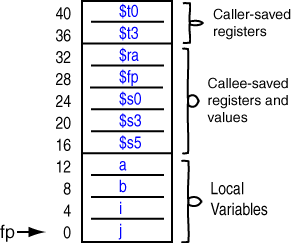Answer:
Yes.
Yes.

Programming languages have global variables. Also, a program block nested within other program blocks can use variables of the outer blocks. Let us skip these details and implement local variables, only. The details may be convered in a course on compilers or in a course on programming languages.
The picture shows a stack frame of an active subroutine. As always (for these notes), each item on the stack is four bytes long.
As previously, the caller pushes values from T registers
that it will need to restore when control returns.
The subroutine (the callee) pushes values from S registers that
it might change.
In this example, space is reserved in the stack for implementing
four local variables a, b, i and j.
In the picture, the space reserved for variable a is
labeled "a", but of course what is in that space is the 32-bit
pattern that the variable holds.
Usually our variables will be integer variables.
A variable is a location in the run-time stack that is used to store data. The values stored in a variable may change as the program executes.
Variable a is the space on the stack.
There is no other "thing" that implements the variable.
In the program, manipulating a variable
is done by using registers to load and store values from
the variable's space in the stack.
However, the variable is the space in the stack, not a register.
When the stack frame is popped, what happens to the local variables?